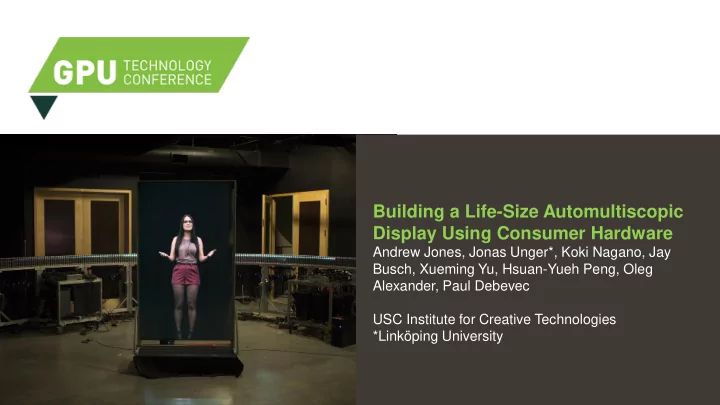

Building a Life-Size Automultiscopic Display Using Consumer Hardware Andrew Jones, Jonas Unger*, Koki Nagano, Jay Busch, Xueming Yu, Hsuan-Yueh Peng, Oleg Alexander, Paul Debevec USC Institute for Creative Technologies *Linköping University
Stereoscopic Automutiscopic
Automutiscopic How do we capture, render, display automultiscopic content?
Projectors Anisotropic screen Audience
1 st prototype 2 nd prototype Focus on face Full-size bodies
3D Geometry Image-based Light Fields custom vertex shader custom pixel shader
Bandwidth 1920 x 1080 x 60 fps x 360 ⁰ x 24 bit = 134GB / sec Large number of output streams Data transfer to GPU
Our Approach • Distribute rendering across multiple GPUs and computers • Scalable, additional projectors increases field of view
Kara video
projectors screen Screen materials: • Horizontal lenticular • Light shaping diffusers • Brushed metal • Privacy filters Takanori Okoshi, Three-Dimensional Imaging Techniques , Academic Press 1976 Fig. 5.5(b), “projection -type three- dimensional display”, p. 131
Anisotropic Projector Arrays Holographika [Yoshida et al. 2011] [Agocs et al. 2007] [Kawatika et al. 2012]
Projector Array • 72 TI DLP Pico – 480 x 320 Resolution – Mini HDMI input • 1.66° Angular Resolution • 110° Field of View
Anisotropic Screen • 40 lines per inch Lenticular screen from Microlens Inc. • 1° horizontal x 60° vertical diffuser from Luminit Co.
Graphics Cards AMD Radeon 7870 graphics cards, 4 x 6 Mini DisplayPort outputs = total 24 outputs DisplayFusion (nView, Ultramon)
Video Splitters 24 Matrox TripleHeadToGo video splitters – 1 DisplayPort input, 3 DisplayPort outputs each
DisplayPort 1.2 • Multi-Stream Transport (MST) • Appear as separate displays • Each display can have different resolution/refresh rate etc • Each graphics card still has upper bound for total number of streams
Multiple-center of projection Every pixel rendered from different viewpoint
current Vertex projection viewer possible viewers • For each vertex, find corresponding viewer screen • Project back onto vertex screen from view point projectors
current Vertex projection possible viewer viewers current projector vertex S screen
Runing in Activision pipeline • Picture of Activision demo
Multiple viewers • Sum of weighted Gaussians • Can revert back to default height and distance • Falloff distance ≈ width of shoulders
Anisotropic Projector Arrays • 72 TI PICO projectors Jones et al. “ Interpolating Vertical Parallax for an Autostereoscopic 3D Projector Array”. SPIE Stereoscopic Displays and Applications 2014
Projectors
Vivitek Qumi projectors • 1280 x 800 pixels • LED light source • 300 Lumens • Low power, small size • ~$300 each
The Anisotropic Screen 1° horizontal x 60° vertical diffuser from Luminit Co
The Anisotropic Screen Light from each projector is scattered as a vertical stripe
The Anisotropic Screen Light from each projector is scattered as a vertical stripe
The Anisotropic Screen Each view is composed of multiple projector stripes
The Anisotropic Screen Each view is composed of multiple projector stripes
Light Stage 6 8 meter geodesic dome LED illumination 30 cameras
Capture
Video showing input clips
Light Field Sampling 0.625 degrees between projectors
Light Field Sampling 1.75 degrees between eyes at 2 meters
Light Field Sampling 6 degrees between cameras
View Interpolation Proxy geometry Actual geometry Camera 1 Camera 2 Virtual View
View Interpolation Proxy geometry Actual geometry Camera 1 Camera 2 Virtual View
Geometry Reconstruction • Visual hulls, stereo reconstruction • Relatively slow Image-Based Visual Hulls Matusik et al ., SIGGRAPH ‘00 • AGIsoft - 40 minutes per frame with 30 cameras Free-viewpoint Video of Humans Carranza et al ., SIGGRAPH ‘03
Einarsson et al. “Relighting Human Locomotion with Flowed Reflectance Fields”, EGSR 2006
M. Werlberger, T. Pock, and H. Bischof: Motion Estimation with Non-Local Total Variation Regularization , IEEE Conference on Computer Vision and Pattern Recognition (CVPR), San Francisco, CA, USA, June 2010.
View Interpolation Proxy geometry Actual geometry Camera 1 Camera 2 Virtual View
View Interpolation Proxy geometry Actual geometry Camera 1 Camera 2 Virtual View
Modular • 4 carts, 72 projectors
The Interview
Video Decoding • 11 source videos, 20 optical flow videos per GPU • CPU decoding FFMPEG (multi-core) • GPU MPEG video decoding (NVCUVID)
Distributed rendering Windows 7 Default: commands sent to most single GPU and blitted across Current solution: New instance of application per GPU Next step: OS/Vendor specfic extensions to assign resources to GPUs (ie WGL_NV_gpu_affinity) Shalini Venkataraman , “ Programming Multi-GPUs for Scalable Rendering ” GTC 2012
Ongoing Work • Incorporate natural language processing / artificial intelligence • Extend up to 30+ hours of interview Arstein et al. “Time -Offset Interaction with a Holocaust Survivor”, Proceedings of International Conference On Intelligent User Interfaces (IUI) , 2014
Conclusions • Simple techniques for rendering geometry and light fields for automultiscopic displays • Limited by GPU bandwidth • Need new tools to exploit redundancy, and distribute resources across views
Questions Thanks to CNN, Morgan Spurlock, Inside Man Productions, Shoah Foundation, Pinchas Gutter, Julia Campbell, Bill Swartout, Randall Hill, Randolph Hall, U.S. Air Force DURIP, and U.S. Army RDECOM http://gl.ict.usc.edu/
Recommend
More recommend